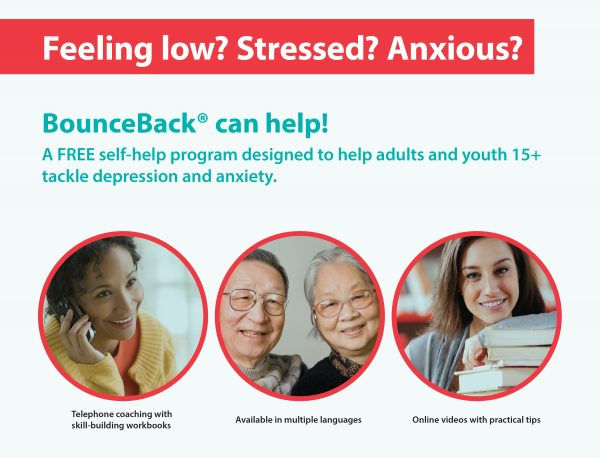BounceBack

BounceBack was developed by Dr. Chris Williams, a professor of psycho-social psychiatry at the University of Glasgow, Scotland. First adopted by CMHA British Columbia, the program has enjoyed nine years of success with over 40,000 clients. Results show that symptoms of depression and anxiety are reduced by nearly 40% at program completion. There are also significant improvements in life-enjoyment and physical-health ratings.
In October 2017, as part of the Government of Ontario’s investment in publicly-funded psychotherapy services, BounceBack was launched across the province. BounceBack is managed by CMHA Ontario and CMHA York and South Simcoe with funding provided by the Government of Ontario. It is a free, evidence-based, skill-building program designed to hep adults and youth (aged 15+) manage symptoms of mild to moderate depression and anxiety.
“At the post-secondary level, students often face a lot of anxiety. There are many different roles that they are trying to assume and coping with an influx of new and different things. It can be overwhelming. The BounceBack program exists for students to call in when they are going through a difficult time. They will talk to a coach and the coach chooses the best program for the student, which can vary from 2-6 sessions.” says Dr. Christine Courbasson, one of the clinical psychologists providing clinical oversight to the BounceBack program at CMHA-York.
During three to six telephone sessions, trained coaches motivate and support clients as they work through a series of workbooks that are personalized to their current needs. Together, the coaches and clients will select from among 20 workbook topics. Some popular workbooks are: Being assertive; Changing extreme and unhelpful thinking; Overcoming sleep problems. To be eligible for the program, participants should not be in crisis or at imminent risk. BounceBack coaches are like trainers at the gym; their role is to help the client develop new skills, keep them motivated, and monitor how they’re doing. Because coaches are not clinicians, they don’t provide counselling. Coaches are extensively trained and overseen by clinical psychologists in the BounceBack program.
“It’s a flexible program. Many students won’t always have the time or a schedule that allows them to attend in-person counselling sessions. BounceBack is a lot more accessible because it’s all done over the phone,” Dr. Christine Courbasson adds.
Access to the program is by referral through a family doctor, nurse practitioner, psychiatrist, or client self-referral. If clients submit a referral themselves, their primary care provider is notified and kept informed of their progress in the program.
Since its launch, BounceBack has been reaching out to campuses across Ontario to promote the program and increase access to psychotherapy for youth. If your campus is interested in learning more about BounceBack, contact their Stakeholder Engagement Coordinator, Anna Piszczkiewicz at apiszczkiewicz@ontario.cmha.ca.
At CICMH, we’d like to thank Dr. Christine Courbasson for their time. If you’d like to find out more about BounceBack, visit the CMHA website.
More Information
Browse Spotlight Interviews
April 4, 2018
Talk Today
April 17, 2018

